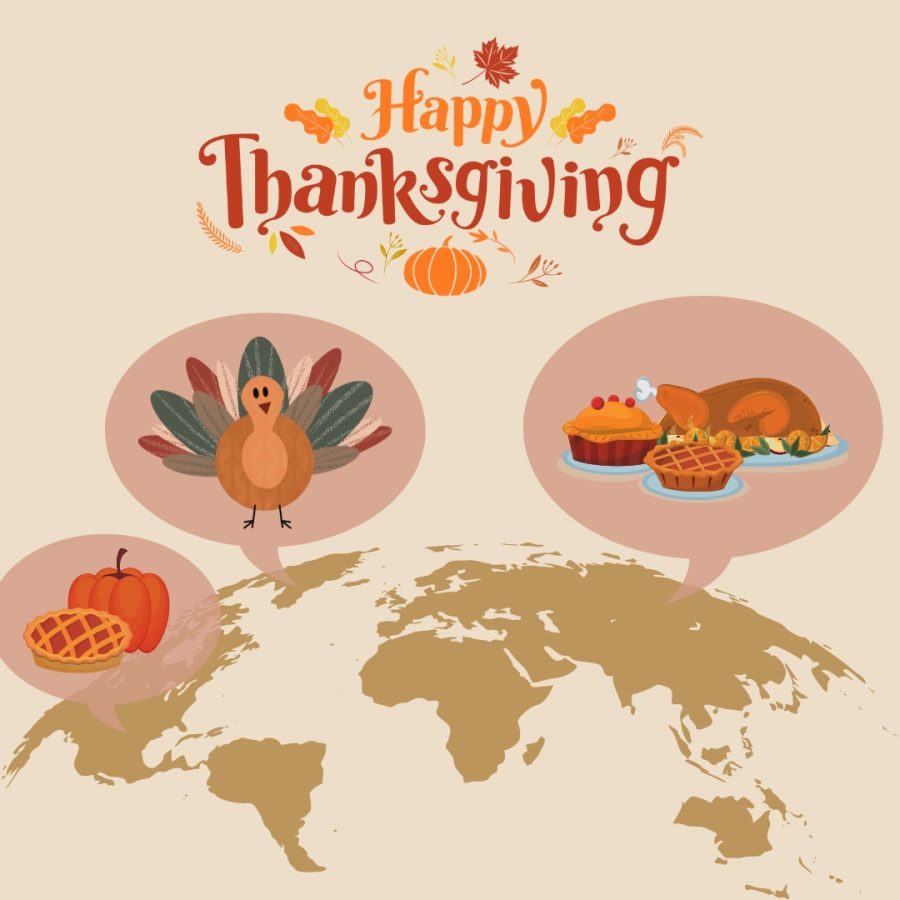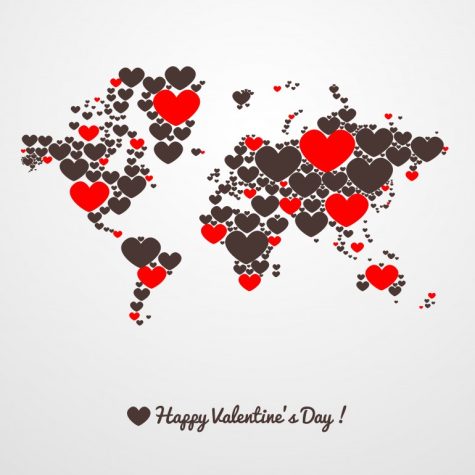Thanksgiving: America’s origin and a tour around the world
Thanksgiving is here! Yes, I know. Already! Besides eating pumpkin pie, you might want to use the next few days to learn more about this important national holiday.
According to History.com, Thanksgiving started long ago, in 1621, with Native Americans who had been holding harvest festivals long before Europeans.
“The Plymouth colonists [the Pilgrims] and the Wampanoag [a local tribe of Native Americans] shared an autumn harvest feast that is acknowledged today as one of the first Thanksgiving celebrations in the colonies,” according to History.com.
Moving forward in the timeline, the festive day became an official holiday only a century later with George Washington.
“In 1789, George Washington issued the first Thanksgiving proclamation by the national government of the United States; in it, he called upon Americans to express their gratitude for the happy conclusion to the country’s war of independence and the successful ratification of the U.S. Constitution.”
Extra bit of trivia: New York was the first state to officially adopt Thanksgiving as an annual holiday in 1817.
Still, Thanksgiving feels like a very American holiday. But what if I told you that it is not? Besides the U.S., many other countries have their variations of harvest festivities.
Find below 10 interest facts about Thanksgiving observances outside the U.S.
1. Canada (second Monday in October): The first Canadian Thanksgiving was held before America’s (surprise!) in 1578. Besides some similarities, Canadians and Americans do not celebrate the same Thanksgiving.
“While the US celebrates the ‘feast’ shared by Pilgrims and Wampanoags, Canadian Thanksgiving started when British explorer Frobisher and his crew returned from their search of the Northwest Passage. To give thanks for their safe return, they organized a feast.”
2. Germany (first Sunday in October): Germany’s celebration is mainly religious and occurs around the time of the main harvest.
“During a typical Erntedankfest, celebrants may carry an Erntekrone (“harvest crown”) of grains, fruit, and flowers to the church in a solemn procession, and feast on such hearty fare as die Masthühnchen (fattened-up chickens) or der Kapaun (castrated roosters).”
3. The Netherlands (fourth Thursday of November): Unlike other countries, only the city of Leiden celebrates Thanksgiving here, and it has everything to do with the U.S. celebration. Why? The English settlers who traveled to the New World [the Pilgrims] spent years in Leiden.
“As a result, some have claimed that the Pilgrims’ first Thanksgiving celebration was actually inspired by Leiden’s annual commemoration of the breaking of the Spanish siege in 1574. In any case, the people of today’s Leiden continue to celebrate their ties with the Mayflower’s passengers by holding non-denominational church services.”
4. Liberia (first Thursday of November): Liberian Thanksgiving is largely a Christian holiday, but it started in the early 1880s when Liberia’s government passed an act declaring the National Thanksgiving Day.
“Formerly a colony of the American Colonization Society, Liberia declared its independence in 1947. However, the freed slaves from the United States who returned to the country around 1820 brought the Thanksgiving celebration with them. Liberia is probably the only other country in the world that celebrates the American Thanksgiving.”
5. Grenada (October 25): Grenada’s Thanksgiving celebration has an interesting history. The Caribbean Thanksgiving marks the anniversary of a joint Caribbean and U.S. military invasion of Grenada in 1983.
“As a result, on Thanksgiving, Grenadians give thanks for the American-led invasion that helped them take back their country [from Grenada’s deputy prime minister who executed the prime minister and seized power].”
6. Japan (November 23): Japan’s Thanksgiving is less about celebrating and more about reflecting. Kinro Kansha no Hi (Labor Thanksgiving Day) evolved from an ancient rice harvest festival.
“The modern tradition of Labor Thanksgiving Day began in 1948, just three years after World War II ended, as a celebration of the rights of Japan’s workers. Today, the public observes it as a national holiday, and labor organizations lead events where citizens are encouraged to celebrate the principles of hard work and community involvement.”
7. United Kingdom (late September or early October): The UK actually celebrates a Harvest Festival. The interesting thing is, even if churches still celebrate the holiday, its origin dates far back before Christianity become the country’s religion.
“During pre-Christian times in Britain, the Saxons would offer the first sheaf of cereals to fertility gods, then come together and celebrate the harvest with a supper.”
8. Norfolk Island (last Wednesday of November): A former British colony and current Australian territory, this remote island is another unlikely place for a holiday celebration with American roots. Their Thanksgiving celebration comes from a tourism strategy from the mid-1890s.
“Thanksgiving tradition dates back to when the American trader Isaac Robinson decided to put on an American-style Thanksgiving service in the All Saints Church in Kingston to attract some visiting American whalers to the celebration.”
9. Puerto Rico (fourth Thursday in November): Being part of the U.S. territory, Puerto Rico celebrates Thanksgiving in a very Americanized way — but still finds a way of adding its own twists.
“There is usually turkey — whether a roasted, seasoned pavochón or a turkey stuffed with mofongo (a mashed plantain dish) — but roast pork is also a common item on the menu, accompanied with more plantains, rice and beans.”
10. Most civilizations that built their history and habits from agriculture celebrate some form of a harvest festival. Another root of the holiday is external influences from colonization.
Happy Thanksgiving!
Independently of where you are and how you do it, may your celebrations be full of reasons to be thankful.
*To know more about Thanksgiving around the world, check History.com, Mondly.com, and All that’s Interesting.










